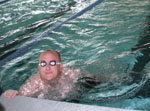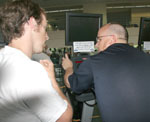Triathlon event helps athletes meet
goals
by Cindy
AbolePublic Relations
Greg Shore knows what it’s like to go the distance, find personal success with his health and enjoy a better quality of life.
 Wellness Center
coaches Janice Newton, center, and Megan Derosiers monitor athletes
during the cycling stage of the MUSCMan Triathlon Sprint Event.
Wellness Center
coaches Janice Newton, center, and Megan Derosiers monitor athletes
during the cycling stage of the MUSCMan Triathlon Sprint Event.The MUSC Harper Student Wellness Center member put his body and will to the ultimate test in the MUSCMan Triathlon Sprint Event held June 11-15 at the Harper Wellness Center. Thirty-one participants swam, cycled and ran to compete against themselves. For six weeks, these athletes trained and steeled themselves to swim 10 laps (about 1/4 mile), cycle 10 miles, and run 18 laps (equivalent to 3 miles).
“Everything has been positive about this program,” said Bobby Shaw, MUSC Wellness Center director. “The program featured athletes from both ends of the spectrum—beginners to experts. We were able to provide a great level of instruction and support. The Wellness Center focuses on creating programs to keep members and athletes motivated to meet their fitness goals.”
 Competitor Greg
Shore completes 10 laps during his quest to complete the MUSCMan
Triathlon.
Competitor Greg
Shore completes 10 laps during his quest to complete the MUSCMan
Triathlon. Shore’s experience seems to echo Olympic long-distance runner Steve Prefontaine’s analogy, that “Success isn’t how far you go, but the distance you traveled from where you started.”
For the past year, Shore, a 45-year-old northern California native, has gone through an incredible personal journey. Like a long distance race, it has challenged him to his mental and physical limits, helped him take charge of his health, and improve his outlook on life.
A profound diagnosis
This chapter of Shore’s life began the summer of 2005 when he was diagnosed with type 2 diabetes. His first priority was to find a physician who could help him understand the disease. He wanted a doctor he could trust.
Last summer, Shore contacted friend and MUSC internal medicine resident Ed O’Bryan, M.D., after a test reported that his blood sugar level was 575. Normal blood sugar levels fall between 70 and 125 mg/dL. O'Bryan arranged for an appointment and appropriate lab work. A test was ordered to determine Shore’s A1-C level or blood glucose level, which provides an average blood glucose control level over 90 days. It was 11. Normal levels are between 5.5 and 6.5.
 Dr. Ed O'Bryan
applaudes Shore on his efforts during the bike event.
Dr. Ed O'Bryan
applaudes Shore on his efforts during the bike event.Knowing that Shore was soon heading to Uganda for a church mission trip, O’Bryan started him on an aggressive drug therapy to help gain control of his blood glucose levels. Fearing Shore’s condition, O’Bryan prescribed 2,000 mg of Metaformin and 10 mg of Glucotrol XL daily. He also arranged for Shore to see diabetes educator Laura Foxhall, University Internal Medicine, to learn how to inject insulin should the oral medications prove to be ineffective.
Without drastic changes, Shore would be on the fast track to a lifetime of insulin injections and the chance of developing heart and vascular disease, kidney and neurological failures, and blindness—complications caused by diabetes.
By the end of summer, the new medication regime proved to be effective. Shore’s A1-C levels fell from 11 to 7.6. Shore, communications director at St. Andrew’s Church in Mount Pleasant, realized the seriousness of his condition and embraced a new attitude, committed to more healthy choices and lifestyle changes.
For fitness, O’Bryan encouraged his patient-friend to begin exercising. After Shore professed that he didn’t know what to do for an exercise program, O’Bryan encouraged him to attend MUSC’s Wellness Center Boot Camp, an intense physical fitness training class taught by U.S. Marine Corps drill instructors that lasted 12 weeks.
“I told Ed that enrolling in a fitness program without accountability would never work for me,” Shore said. O’Bryan assured him that he would share in his accountability, and they both enrolled in last September’s class. Within weeks, he couldn’t believe his own progress and his commitment. During the early days of Boot Camp, Shore ran the mile in 15:10 time. He performed 13 push-ups and 25 sit-ups. After three months, Shore’s mile run improved to 13:30 minutes. He was able to complete 25 push-ups and 51 sit-ups. Shore’s performance in the most recent Boot Camp continues to improve. He can now run a 9:08-mile, complete 50 push-ups and 64 sit-ups.
A modest and friendly guy, Shore credits his success to the camaraderie of others. “I was amazed at the continuous support I’ve received from friends, other Boot Camp participants and Wellness Center staff,” he said. “At times, their encouragement overwhelmed me.”
“I’ve known Greg for about four years and he is really an exceptional patient and friend,” O’Bryan said. “Lots of patients with diabetes like Greg don’t want to take medicine to control their disease. Some patients want to take a proactive approach through diet, exercise and learning about their condition to become more informed. Most importantly, they communicate with their doctor, and together, they make informed decisions about managing their disease.”
Currently, Shore’s biggest motivator to continue in his exercise regime has been to see his blood glucose levels improve. In November his A1-C was 6.1 and O’Bryan cut his Glucotrol dosage in half and virtually eliminated his blood pressure medication. In February, Shore’s lipid profile was normal for the first time in years, and his A1-C had again dropped to 5.8. He no longer takes Glucotrol. In May his A1-C was 5.6 and the dosage of Metaformin also was cut in half.
After contending with diabetes and its related complications, and winning, he now competes as a athlete. Shore ran several road races this year, including a recent 15K (9.3 mile) race in Ontario, Canada. And when news of the Wellness Center’s MUSCMan Triathlon Training program was unveiled in April, Shore felt motivated to add a structured fitness program that would include swimming and cycling with his running routine.
The MUSC program was created to challenge athletes at all levels in these three sports areas. The event is a precursor to Charleston’s annual Sprint Triathlon Series held at James Island County Park.
Shore trained and attended the weekly bike and stroke clinics. For swimming, he learned swim techniques, breathing, rotation and body positioning from swim coach Megan Derosiers, who also is an Iron Man finisher.
“This was a great experience,” said Derosiers. “I’ve coached for almost nine years and never worked with a large group like this before. Everyone’s swim experience was at different levels. They all improved so much from day one. All of them learned something new and it’s great to see that.”
Shore’s final result was 500-meter swim (12.17 minutes), 12-mile stationary bike (34.15), and 3-mile indoor track (33.42), for an overall triathlon time of 1:20:11.1.
Shore credits many people in helping him find success in this part of his life. “God placed the right people in my path through this journey, for which I am eternally grateful. Janice Newton, the Wellness Center’s program coordinator, instructors, especially Mike Harris, my friends, Steve Wood and Kem Fronaberger, and others who provided the strength and guidance that I needed at the right time.”
What participants were saying about the MUSCMan Sprint Triathlon:
“The Triathlon Training Program has been a big asset to people interested in increasing their endurance capabilities. The guidance and schedules provided by the staff made it possible to achieve the final goal. The nice organization and planning of the Training Program transformed the personal effort to a final great satisfaction. This type of program opens new avenues to already developed or potential new athletes.”
—Eduardo Maldonado
Department of Pharmaceutical Sciences
“I was very impressed with the level of knowledge and expertise of the trainers. This series provided an in-depth knowledge of how to enhance swimming, biking and running techniques and offered an excellent cross-training opportunity to improve my exercise program. It was very motivating and fun to be part of a program with such a variety of individuals with various experience and age levels.”
—Lynne M. Barber
Business Development and Marketing Services
“This was my first Sprint distance triathlon and I am hooked now. The training period was exceptional, especially the swimming classes that helped to increase my performance by improving my technique. Overall, the classes were well organized and I plan to refer to the handouts for my own personal training. Needless to say, the Harper Student Wellness Center training facilities were perfect in preparing for this indoor event. After the event, I plan to keep up with the training and aim for Olympic International Distance...Endure!”
—Tom Theruvath, M.D., Ph.D.
“I have completed some triathlons in the early 90s, but needed some motivation to return to the sport. The MUSCMan Triathlon, with its coaches, was my catalyst. Megan, the swim coach, improved the efficiency of my swim stroke tremendously. I also learned a lot from the nutritionists who spoke to us on the proper fuel for our bodies. Kudos to Janice Newton and the rest of her team for a job well done!”
—Bruce E. Miller
Friday, July 6, 2007
Catalyst Online is published weekly,
updated
as needed and improved from time to time by the MUSC Office of Public
Relations
for the faculty, employees and students of the Medical University of
South
Carolina. Catalyst Online editor, Kim Draughn, can be reached at
792-4107
or by email, catalyst@musc.edu. Editorial copy can be submitted to
Catalyst
Online and to The Catalyst in print by fax, 792-6723, or by email to
catalyst@musc.edu. To place an ad in The Catalyst hardcopy, call Island
Publications at 849-1778, ext. 201.